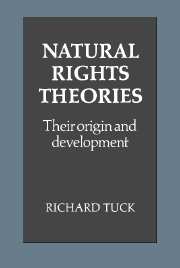Summary
The years 1640–3 saw not only the publication of the major works in the conservative natural rights tradition, but also the appearance of a rival way of talking about natural rights. As we saw in Chapter Three, Grotius provided the basic language for both traditions: the conservatives drew on the central idea of free men being capable of renouncing their freedom, while the radicals drew on the (in Grotius, more peripheral) idea of interpretative charity applied to fundamental political agreements. Radicalism of this kind seems in the present state of our knowledge to have been at this time an exclusively English phenomenon: some Dutch lawyers took up Grotius's remarks in the Inleidinghe about inalienable liberty and used them to attack slavery, but no Dutchmen before the 1650s seem to have used the rather different and much more general arguments of the De Iure Belli.
It must be stressed that while the principle of interpretative charity led directly to the notion of ‘inalienable rights’, the radicals never abandoned the basic rights theory common to both traditions. Logically, according to both, it is possible for free men to renounce all their natural rights; but charity, according to the radicals, requires that we assume that they have not done so. We must presume that our predecessors were rational, and hence that they could not have intended to leave us totally bereft of our rights.
- Type
- Chapter
- Information
- Natural Rights TheoriesTheir Origin and Development, pp. 143 - 155Publisher: Cambridge University PressPrint publication year: 1979
- 1
- Cited by



